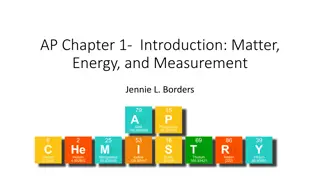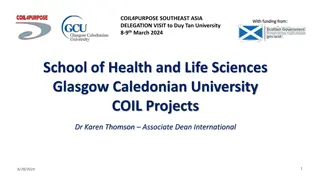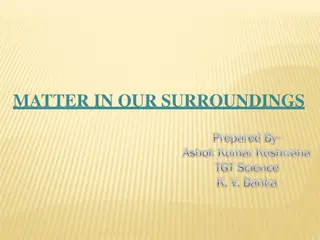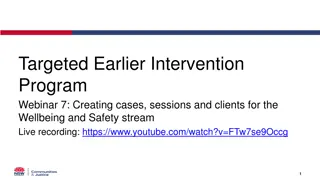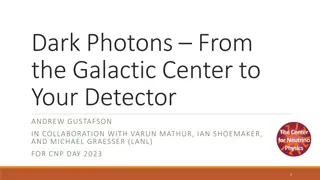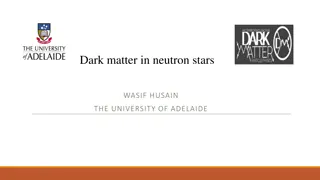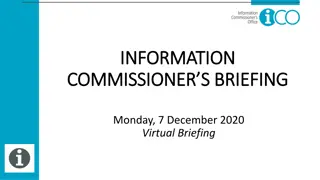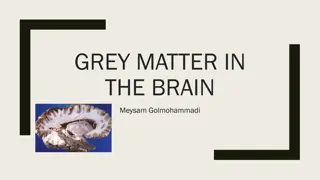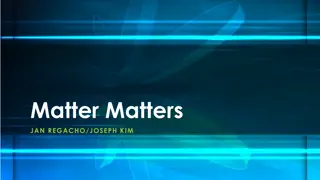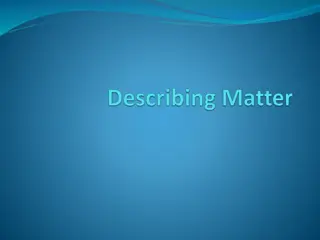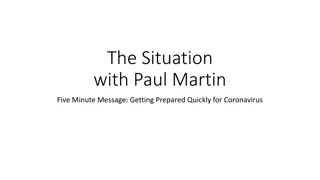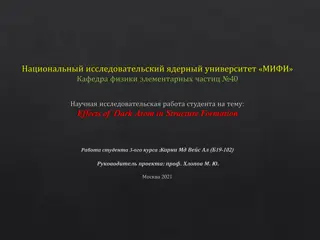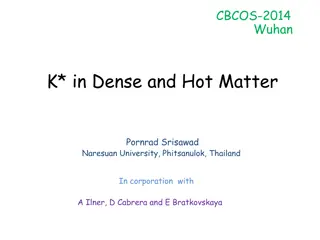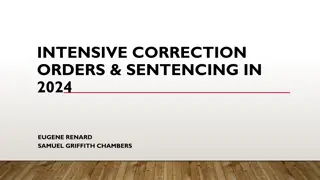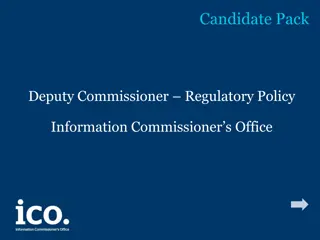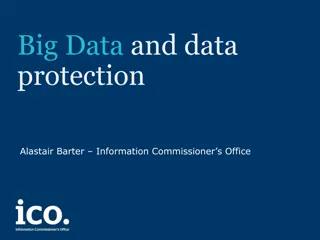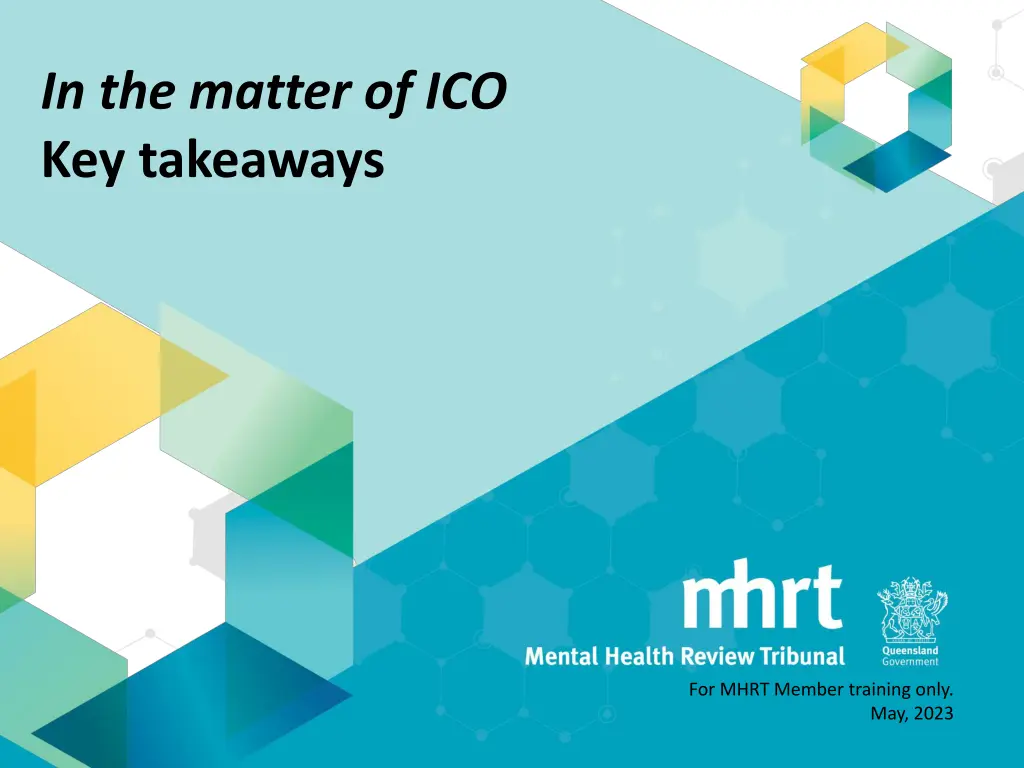
Key Takeaways from ICO Decision on ECT Application for Patient with Schizoaffective Disorder
Explore key insights from the MHRT and MHC decisions on an ECT application for a patient with a history of schizoaffective disorder, treatment resistance, and challenging symptoms. Delve into the patient's history, Queensland relocation, ECT application details, and MHRT hearing outcomes to understand the complex case and decisions made.
Download Presentation

Please find below an Image/Link to download the presentation.
The content on the website is provided AS IS for your information and personal use only. It may not be sold, licensed, or shared on other websites without obtaining consent from the author. If you encounter any issues during the download, it is possible that the publisher has removed the file from their server.
You are allowed to download the files provided on this website for personal or commercial use, subject to the condition that they are used lawfully. All files are the property of their respective owners.
The content on the website is provided AS IS for your information and personal use only. It may not be sold, licensed, or shared on other websites without obtaining consent from the author.
E N D
Presentation Transcript
In the matter of ICO Key takeaways For MHRT Member training only. May, 2023
Introduction MHRT heard an application for approval to perform ECT on patient and approved 12 treatments over 60 days. The patient, represented by LAQ, appealed the decision to the MHC. The MHC ordered a stay of the MHRT s decision so that the patient did not receive ECT. The MHC decided to allow the appeal, set aside the MHRT s decision and refuse the application for ECT. MHC published deidentified reasons on its website: In the matter of ICO. Reasons are quite long and cover a lot of ground. We will look at some key takeaways from the decision . 2
Patients history Patient discharged from NSW health service in April 2022. Discharge summary noted: she had longstanding treatment resistive schizoaffective disorder, history of undiagnosed eating disorders, poor compliance with oral medication. she could become unwell even when compliance was monitored. she had a history of multiple admissions due to relapse. symptoms included poor self-care, malnourishment, responding to internal dialogue, misinterpreting actions, rude, argumentative, irritable, dismissive, threatening, refusal to engage with mental health services, suspicion and guardedness, paranoid and delusions, increased sexual- related themes including public nakedness and accusations of paedophilia and sexual abuse by her father. presentations are highly interchangeable from one fortnight to the next. she had limited insight and does not believe treatment is necessary. She could be vague and evasive when describing her symptoms. 3
Patients history - Queensland After relocating to Queensland, in September 2022, QPS took patient to hospital under an EEA. Found walking the streets in the rain, naked, thought disordered and refusing to engage with services. Placed under a TA and transferred to HDU. Treating team sought second opinion regarding medication optimisation in November 2022: EPSE was discussed and could contribute to agitation and hostility. clozapine rechallenge was considered but not appropriate at that stage. optimisation of lithium dose. optimisation of olanzapine with additional oral dose. consider increasing zuclopenthixol if no improvement. consider augmentation with ECT if symptoms persist. 4
ECT application ECT application made to the MHRT on 3 February 2023. It noted: clozapine treatment had been trialled in the past, discontinued due to severe leucopenia, ECT would be the alternative evidence-based treatment option. engagement with the patient s family confirmed patient had been having more frequent episodes with increasing severity; she had not been completely well in the last 2-3 years; ECT proposed in NSW but not progressed. the family agreed ECT should be considered. 5
MHRT hearing and decision Doctor s opinion: despite being in a structured and supportive environment, on 2 depot antipsychotics and mood stabiliser, the patient s mental state continued to fluctuate with regular positive symptoms and poor self-care, social interaction and engagement with treating team. There was a concern the patient could not be managed in an open ward with her level of psychosis. Doctor who provided medication optimisation report in November 2022 provided a second opinion for the application. Second opinion stated patient s mental state had not changed or improved and doctor supported plan for ECT. Patient s views, wishes and preferences were that she did not want ECT. MHRT found the patient did not have capacity and approved ECT on the basis of clinical merit (s509(4)). 6
Additional material before the MHC for the appeal Doctor s report dated March 2023 provided: ECT was being considered as a last treatment option which had not been trialled before. on first day of proposed treatment, patient informed team she was appealing so team put a hold on ECT. patient continued to be psychotic and disorganised. team did not consider ECT to be an urgent intervention but continued to recommend given non-response to pharmacological treatment options. Same doctor prepared update later that month: patient s mental state: appeared alert and orientated, detailed cognitive assessment not attempted, mood elevated, easily agitated, guarded initially and agitated when discussing ECT, pressure of speech when discussing appeal, thought disordered, no AH, no insight. 7
Additional material before the MHC for the appeal Dr Scott prepared an independent report for the MHC (April 2023). Report noted: it was likely the patient had chronic schizophrenia, marked by irritable mood, and paranoid and grandiose delusions. patient was not well enough to leave hospital. there had been a clear deterioration in the patient s mental health in the last 2 years an overall functional gradual decline with more frequent and severe symptoms over a 2 year period where she had never had full remission. the patient had good self-care, was orientated and alert, was not hypervigilant, agitated or guarded, demonstrated no pressured speech, no clear disorder of thought form. patient s thought content consisted of paranoid and grandiose themes and were likely delusional. patient s judgment was chronically impaired and she demonstrated no insight into her chronic mental illness or need for treatment. 8
Additional material before the MHC for the appeal Dr Scott gave the following evidence in relation to schizophrenia: it is a chronic, relapsing illness. the more a person experiences periods of untreated psychosis, or sub-optimally treated psychosis, will result in more cognitive and functional decline. where a patient has long periods of untreated psychosis becomes immured and habituated to that lower functioning, their ability to imagine an improved mental state is diminished. treatments like ECT can try and avoid such deterioration for patients. 9
Basis for the appeal The appeal was argued on 2 grounds: whether the patient can give informed consent in relation to ECT LAQ argued evidence demonstrated the patient s capacity to provide informed consent: the patient accepted she had a mental illness she did not want ECT because she was concerned about memory and cognition problems she preferred psychotherapy/psychoanalysis instead of taking medications with side effects her plan was not to have ECT and wait to get discharged. whether ECT is appropriate in the circumstances LAQ argued it was not because there remained an alternative to ECT that should be explored. LAQ submitted the patient would consider treatment by clozapine. We will first look at the MHC s reasoning in respect of capacity and then turn to appropriateness of ECT in the circumstances. 10
MHCs decision - capacity MHC concluded the patient did not have the capacity to provide informed consent to ECT. It found the patient had no insight into the complexity of her chronic relapsing mental illness and its effects on her mood, thoughts and behaviours. This lack of insight into her illness and need for treatment affected her ability to understand the nature and effect of a decision to give consent to treatment of ECT. The patient did not have, in general terms, the ability to identify the advantages/disadvantages of the available options and to understand the consequences of those options, then weigh those consequences and reach a decision. 11
MHCs decision capacity cont. In reaching that conclusion, the MHC noted: the application stated the patient continued to display psychotic symptoms with poor insight into her illness despite admission since September 2022 and 2 depot antipsychotics over a sustained period of time. it cannot be the case that because the patient refuses the best treatment available, then she is taken not to have the ability to understand the nature and effect of the decision even if such a decision condemns her to being locked in a mental health unit with a prognosis of deteriorating mental health. it rejected the proposition How can you refuse to have treatment for an illness that you don t recognise you have? 12
MHCs decision capacity cont. Instead, MHC drew on the following to conclude the patient did not have the ability to understand the nature and effect of a decision relating to ECT: the patient suffered from chronic paranoid schizophrenia. Her thought content consisted of paranoid and grandiose themes and her comments about her father were likely to be delusional. all reports assessing her mental state noted her lack of insight. whilst she acknowledged that she has paranoid schizophrenia, she was not able to give an explanation about the actual features and implications of her illness and she believed that her thoughts are not psychotic thoughts. the lack of insight fundamentally affected her ability to understand the nature and effect of a decision relating to treatment. her refusal was in circumstances where the treating team, due to her illness, had not been able to have meaningful discussions regarding ECT, including risks and benefits. 13
MHCs consideration of capacity So how did the MHC reach this decision about capacity? The MHC looked at: the test for capacity. what is meant by the ability to understand the nature and effect of a decision relating to ECT per s233(2)(a). the principles that should be kept in mind when deciding if someone has capacity to give informed consent (s233) that can be extracted from the legislation and the case law. 14
Test for capacity MHC specifically noted legislature has purposefully distinguished between meaning of capacity: receiving treatment under the Act s14. to give informed consent to ECT s233. Act acknowledges capacity may fluctuate which is a factor to take into account when determining whether a TA must be revoked (s421). However, test for capacity for ECT, is decision and time specific and is distinct from the test for capacity that applies to involuntary treatment provided under a TA. A person under a TA may be assessed as having capacity to consent to ECT even though they may be assessed at the same time as not having capacity to consent to other treatments. If a person under an involuntary order has capacity to provide informed consent and declines to undergo ECT, the MHRT will be required to respect their decision. 15
Ability to understand the nature and effect of a decision This is one of the criteria when deciding whether a person has capacity to give informed consent to ECT (s233(2)(a)). The MHC had regard to a number of relevant cases from other jurisdictions and submissions from the Chief Psychiatrist. The Chief Psychiatrist submitted to the MHC that a person: must be able to understand that they are making a decision about whether or not to have ECT as a treatment option (nature); and must be able to have at least some basic understanding that ECT is being proposed because the person s doctor considers that it is a treatment that can be effective for their particular mental condition and may be beneficial for them (effect). In light of the above, the MHC came up with a list of matters that are relevant when deciding whether a person can understand the nature and effect of a decision relating to ECT. 16
Principles in relation to capacity to give informed consent The main objects of the Act and the manner in which they must be achieved (s3). Persons who have, or may have a mental illness, have the same human rights as others who do not, and this must be recognised and taken into account. A person s right to respect for his/her human worth and dignity as an individual must be recognised and taken into account (s9). To the greatest extent practicable, a person is to be encouraged to take part in decision-making about treatment and care and in making a decision, the person s views, wishes and preferences are to be taken into account (s5). The Act rejects the best interests paradigm in relation to decisions requiring people to have ECT and requires consideration of the person s views, wishes and preferences together with an appropriateness element such as a clinical merits test. 17
Matters relevant to whether a person can understand the nature and effect of decision re ECT Note: we have included headings which group the matters by topic. The applicable test capacity to give consent to ECT must be established on the balance of probabilities, no party bears the onus of proof on any matter (s685 applies to MHC). a person has capacity to give informed consent to ECT if they have the ability to meet the criteria in s233. the starting point is that a person is presumed to have capacity to make decisions about their treatment and care (s5). the test for capacity applied to ECT is decision and time specific and is distinct from the test for capacity that applies to treatment under a TA. 18
Matters relevant to whether a person can understand the nature and effect of decision re ECT cont. Application where a person is subject to involuntary treatment a person under a TA may be assessed as having capacity to consent to ECT even though they may be assessed at the same time as not having capacity to consent to other non-regulated treatments (e.g. medication). if a person under an involuntary order has capacity to provide informed consent and declines to undergo ECT, then this decision must be respected. Prior explanation in order to have capacity to provide informed consent a person needs to be able to understand the information that is relevant to the decision, including the options and their consequences. This information must be provided to the person before a person gives informed consent to ECT. s234 requires that before a person gives informed consent they must be given the stated explanation. 19
Matters relevant to whether a person can understand the nature and effect of decision re ECT cont. Prior explanation continued the explanation informs the context of whether the person has the ability to understand the nature and effect of a decision relating to ECT. the doctors explanation about these matters, the circumstances in which they were given and the person s response should be recorded in the material so that they can be considered and assessed. based on this information, the person in general terms must have the ability to identify the advantages / disadvantages of the available options and to understand the consequences of those options, then weigh those consequences an reach a decision. 20
Matters relevant to whether a person can understand the nature and effect of decision re ECT cont. The person s understanding a person must be able to: understand they are making a decision about whether or not to have ECT as a treatment option (nature); and have at least some basic understanding that ECT is being proposed because the person s doctor considers that it is a treatment that can be effective for their particular mental condition and may be beneficial for them (effect). to have capacity to give informed consent to ECT, it is not required that they give, or are able to give, careful consideration to the advantages / disadvantages of the treatment. 21
Matters relevant to whether a person can understand the nature and effect of decision re ECT cont. Perceived quality of decision-making it is not required that the person makes a rational and balanced decision, it is enough that the person is able to make and communicate a decision in broad terms as to the general nature and effect of the treatment. the capacity test must be applied in a non-discriminatory manner so as to ensure people with mental illness are not deprived of their equal rights to exercise legal capacity upon the basis of contestable value judgments relating to their illness, decisions of behaviour, rather than upon the basis of the neutral application of the statutory criteria in s233. in short, the test is not to be applied so as to produce social conformity at the expense of personal autonomy. 22
Matters relevant to whether a person can understand the nature and effect of decision re ECT cont. Perceived quality of decision-making continued a person s right to make decisions includes the right to take risks and make bad decisions. those assessing capacity under s233 must not assume because the person is not accepting ECT in circumstances when they objectively should then they do not have the ability to understand the nature and effect of a decision. those assessing capacity under s233 must vigilantly ensure that the assessment is evidence based, patient-centred, criteria focused and non-judgmental, and not made to depend, implicitly or explicitly, upon identification of a so called objectively reasonable outcome. 23
Matters relevant to whether a person can understand the nature and effect of decision re ECT cont. Relevance of insight s233 does not require an assessment of whether a person is capable of understanding that they have an illness, or symptoms of an illness, that affects their mental health and wellbeing. However, such an assessment may be relevant in considering whether the person has the ability to understand the nature and effect of a decision regarding ECT. acceptance of, belief in and insight into the diagnosis of illness and need for treatment varies significantly depending on the person and the situation. a lack of insight may impact a person s ability to understand relevant information, but the presence or absence of insight is not a proxy for the presence or absence of decision-making capacity. 24
Matters relevant to whether a person can understand the nature and effect of decision re ECT cont. Relevant of insight continued depending on the facts, a person with mental illness may lack insight or otherwise not accept or believe that they have a mental illness or needs ECT treatment yet may have the capacity to give informed consent when assessed under s233. The opposite may also be true. those assessing capacity under s233 should not assume that because a person lacks insight into their mental illness they therefore lack capacity to provide informed consent. Further explanation is required as to how this lack of insight affects the person s ability to understand the nature and effect of a decision relating to ECT. those assessing capacity under s233 must set out the reasons why any lack of insight affects the person s ability to understand the nature and effect of a decision relating to ECT. 25
Matters relevant to whether a person can understand the nature and effect of decision re ECT cont. Relevant of insight continued the presence of thought disorder or psychotic thinking clouding the person s judgment or delusions about treatment may lead to the conclusion that the person does not have the capacity to consent. there is not a one size fits all approach. A question of capacity for the purpose of s233 will be fact and context specific. 26
Key takeaways Test for capacity re ECT 1. A person can be on a TA and may also have capacity to give informed consent to ECT for the purposes of s233 the tests are different. 2. Capacity to give informed consent to ECT is decision and time specific, and the question of fluctuating capacity only applies when considering capacity under s14 (i.e. not ECT). This could prove tricky if a person s capacity to consent to ECT fluctuates regularly, and/or quite quickly. Patient s capacity could fluctuate between ECT treatments so multiple applications may be required to complete a course of ECT. Members may be presented with evidence that the patient has capacity at the time of the hearing but is likely to lose that capacity during the next 60-90 days. 27
Takeaways When determining if a person has capacity to give informed consent 1. Have regard to the following principles: the main objects of the Act and the way the Act says they are to be achieved s3. patient has the same human rights as those that do not have a mental illness s5. to the greatest extent practicable, the patient is encouraged to take part in decision- making and regard is had to their views, wishes and preferences. Remember the matters that the MHC considered relevant (in summary): apply the correct test from the Act. in the context of the explanation given by the doctor, can the patient identify advantages and disadvantages of treatment options and understand their consequences, then weigh those consequences to reach a decision. the decision does not need to be rational, the person has the right to make a bad decision . lack of insight into their illness and/treatment does not automatically mean they lack capacity. Need to be able to link lack of insight to any impact on the person s ability to understand relevant information and reach a decision. the assessment is fact and context specific no one size fits all. Consider this patient and their circumstances individually. 2. 28
MHCs decision appropriate in the circumstances The MHC found ECT was not appropriate in the circumstances. This was because it was not satisfied that the evidence supported the finding that ECT was the least restrictive treatment option in circumstances where the patient did not want ECT. It did not have sufficient evidence of the trials of medication or that all other appropriate medications had been exhausted. In my view, this case is not saying that ECT is a treatment of last resort. Treatment options need to be considered in light of: the patient s views, wishes and preferences. alternative treatments and their consequences. the patient s human rights. what is considered least restrictive for that particular patient. 29
MHCs consideration of appropriate in the circumstances The MHC noted that clozapine had previously been trialled, however, she had an adverse reaction. In questioning, doctors gave evidence that: a clozapine rechallenge could be considered as a last option. no emergency ECT had been performed on the basis that the team did not consider the ECT to be an urgent intervention. there were other antipsychotic medications that could be trialled. One of the Assisting Psychiatrist s did not favour retrial of clozapine or alternate medications on the basis that the negative consequences of not having ECT, may outweigh the positive benefits of the alternatives. However, the MHC had regard to advice from the other Assisting Psychiatrists who said that there was insufficient information before the Court to demonstrate that there had been sufficient trials of antipsychotic medication. E.g. there was not enough evidence about whether numerous second generation antipsychotics had been trialled and information about the duration and dosage of the medications that had been given. 30
Matters relevant to whether ECT is appropriate in the circumstances Consideration needs to be given to whether there are other less restrictive, reasonably available alternatives. To identify whether there are other less restrictive, reasonably available alternatives: there needs to be sufficient evidence of adequate trials of alternative treatments (including duration, dosage and alternative medications). in this case, evidence was required as to the following (the treating team may need to conduct further investigations to determine): whether there are alternative medications that could be trialled. whether the medications already trialled were provided at sufficient dosage and for sufficient duration. whether clozapine could be rechallenged (having regard to the opinion of a haematologist). 31
Key Takeaways appropriate in the circumstances Note: in this case the patient was not agreeable to ECT. This may be a very relevant consideration to whether ECT is appropriate. MHC had regard to the patient s human rights and the objects of the Act which require a least restrictive approach- to be able to limit a right in a way that is reasonable and justifiable, consideration must be given to whether there are any other less restrictive and reasonably available ways of achieving the same purpose. So, what is least restrictive for one person may not be least restrictive for another. Need to consider on a case by case basis. 32
Key Takeaways Human Rights There are a number of human rights engaged when making a decision to approve ECT: right to recognition and equality before the law (s15) protection from torture and cruel, inhuman or degrading treatment (s17) right to privacy (s25) right to liberty and security of person (s29) right to humane treatment when deprived of liberty (s30) right to access health services without discrimination (s37). 33
Key Takeaways Evidence Since the explanation required to be given by the doctor to the patient informs the context of whether the person has the ability to understand the nature and effect of a decision relating to ECT the doctor s explanations about these matters, the circumstances in which they were given and the person s response should be recorded in the material. The ECT application should provide comprehensive material as to what medications/other treatments had been considered and used or not used and the reasons for doing so. You may need to prompt treating teams if you require more evidence in that regard noting that the above information will not be required in all circumstances. We are speaking with OCP regarding passing information from this case to AMHSs. 34


